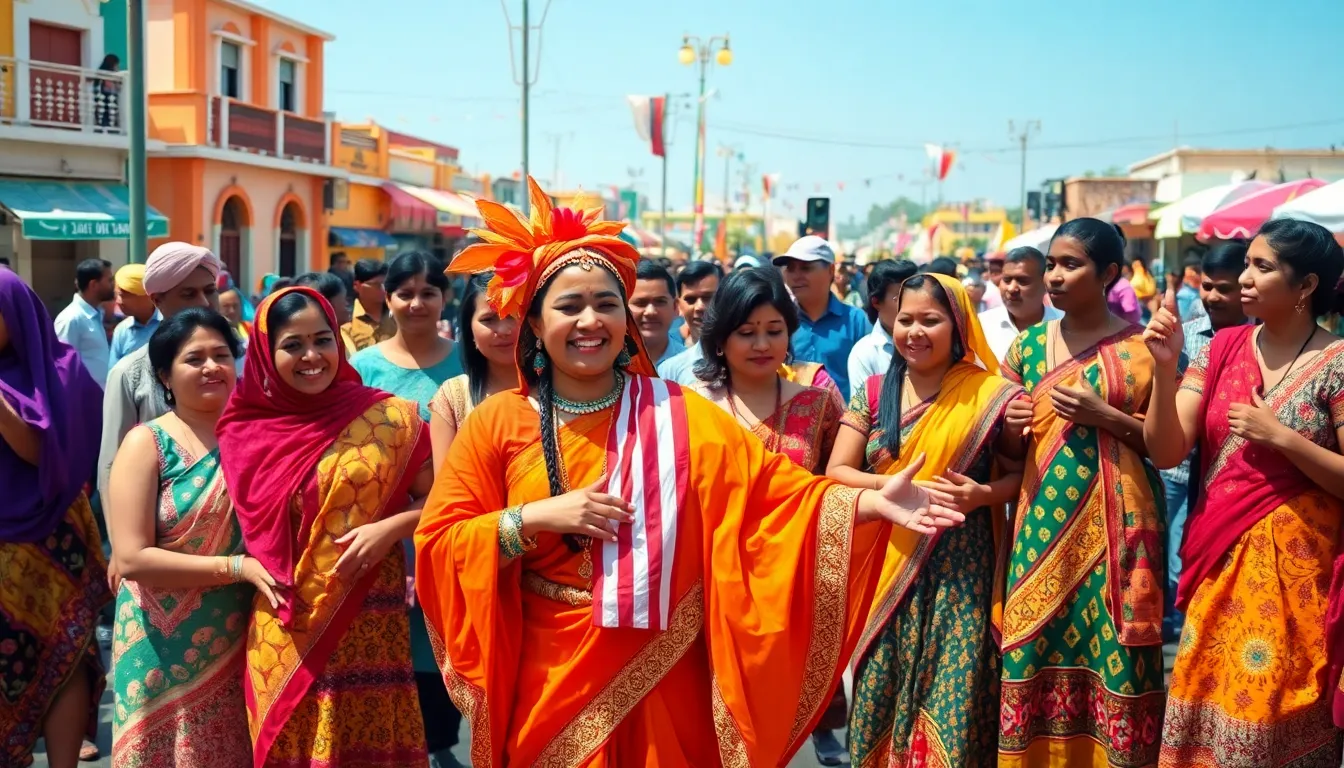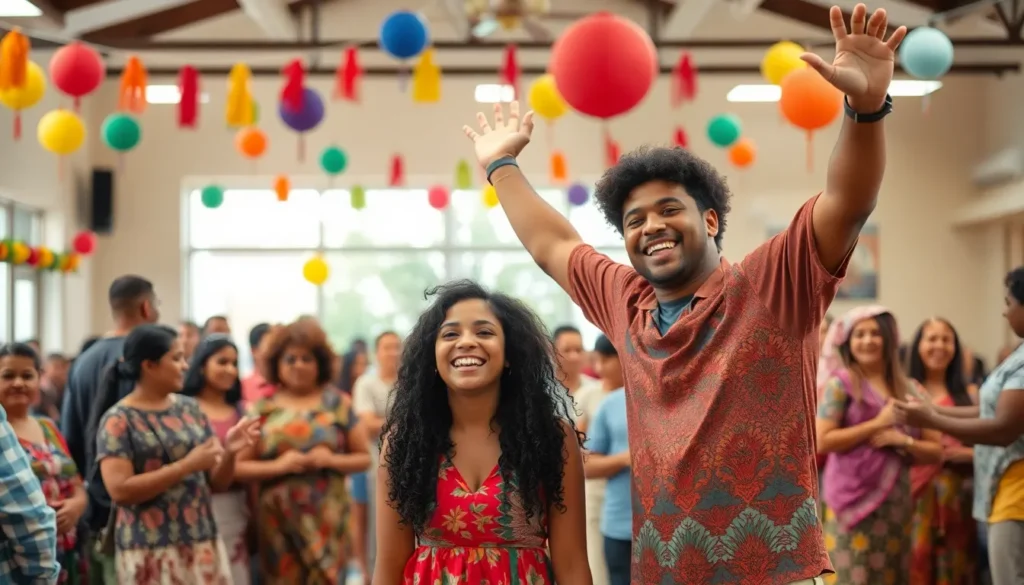In a world bursting with flavors, sounds, and traditions, the Day of Respect for Cultural Diversity reminds everyone that differences aren’t just okay—they’re downright delightful. Imagine a buffet where every dish tells a story, and every story adds a sprinkle of magic to our shared human experience. This day isn’t just about acknowledging diversity; it’s about celebrating it like a kid in a candy store.
As cultures collide and blend, they create a vibrant tapestry that enriches our lives. Ignoring this diversity would be like trying to enjoy a pizza without cheese—possible, but why would anyone want to? Embracing different backgrounds fosters understanding and unity, proving that together, we can create a world that’s not just colorful, but also harmonious. So let’s dive into why this day is essential and how it can inspire a more inclusive future for everyone.
Table of Contents
ToggleOverview of Day of Respect for Cultural Diversity
The Day of Respect for Cultural Diversity occurs annually on April 15. This observance highlights the value and importance of cultural variety in societies. Celebration activities often include educational forums, art exhibits, and cultural performances that showcase different traditions and practices.
Institutions like schools and community centers play a crucial role in promoting awareness. They organize events that engage individuals in discussions about the significance of understanding and appreciating differences. Participation in these activities encourages individuals to explore various cultural perspectives and experiences.
Global recognition of this day underscores the need for unity in diversity. Engaging in dialogues about different cultural backgrounds fosters respect, tolerance, and collaboration. Recognizing shared humanity creates opportunities for connection among diverse groups.
Statistics indicate that societies embracing cultural diversity tend to exhibit higher levels of innovation and creativity. Collaborative efforts among various cultural groups contribute to a richer social fabric. By celebrating cultural identities, communities can effectively combat stereotypes and discrimination.
Such observances also serve as reminders of the ongoing challenges faced by marginalized groups. Awareness efforts draw attention to issues like inequality and social exclusion. Advocating for equal representation encourages dialogue about the role of culture in shaping identities.
The Day of Respect for Cultural Diversity emphasizes harmonious coexistence. Acknowledging the rich tapestry of traditions enhances mutual respect and understanding. Efforts to appreciate diversity ultimately strengthen communities and promote global citizenship.
Historical Background

The Day of Respect for Cultural Diversity has rich historical roots. This observance promotes understanding and acceptance of diverse cultures worldwide.
Origins of the Celebration
The celebration traces back to the 2001 World Conference against Racism in Durban, South Africa. Participants advocated for recognizing and valuing cultural diversity. In 2002, the United Nations General Assembly declared April 15 the Day of Respect for Cultural Diversity, marking a commitment to peaceful coexistence among different cultural communities. This designation aimed to encourage countries to implement policies that protect and promote diverse cultural expressions. Such efforts reflect a global recognition of the importance of fostering mutual respect among various cultures.
Key Milestones
Several key milestones highlight the impact of the Day of Respect for Cultural Diversity. In 2006, the UN launched the International Decade for the Rapprochement of Cultures, emphasizing the importance of cultural dialogue. By 2011, this observation gained formal status as it aligned with the UN’s broader initiatives to combat discrimination and promote human rights. Educational programs and campaigns expanded, aiming to raise awareness about cultural diversity. Various nations also adopted local initiatives to celebrate this day, showcasing art, music, and culinary traditions. Such milestones demonstrate ongoing efforts toward a cohesive global community.
Importance of Cultural Diversity
Cultural diversity plays a vital role in enhancing societal growth and understanding. Embracing a variety of backgrounds fosters unity and respect among community members.
Benefits to Society
Cultural diversity promotes innovation and creativity within societies. Research demonstrates that teams composed of individuals from different cultural backgrounds generate more innovative solutions. Additionally, diverse perspectives lead to improved decision-making in workplaces and communities. Engaging with various cultures enhances social cohesion and creates a vibrant public life. Celebrating differences strengthens the social fabric, making it more resilient during challenges. Communities recognizing and valuing cultural diversity often experience lower levels of discrimination, fostering a sense of belonging among all members. These benefits contribute to the overall well-being and growth of society.
Cultural Awareness and Sensitivity
Cultural awareness encourages empathy and understanding among individuals. It cultivates an atmosphere where differences are respected and valued. Sensitivity to cultural nuances helps prevent misunderstandings and conflicts, benefiting interpersonal relationships. Educational programs focused on cultural diversity raise awareness and highlight the importance of inclusiveness. Schools and organizations that prioritize cultural sensitivity foster environments that embrace dialogue and collaboration. These initiatives lead to stronger connections among individuals from various backgrounds, reinforcing mutual respect and understanding. Consequently, individuals become more engaged global citizens, appreciating the richness that cultural diversity brings to their lives.
Activities and Events
Various activities and events frequently occur on the Day of Respect for Cultural Diversity. These initiatives promote celebration and understanding across different cultures.
Community Celebrations
Exhibitions showcasing local artists and cultural performers take center stage during community celebrations. Festivals often highlight traditional music and dance, allowing participants to experience diverse cultural expressions. Food stalls featuring international cuisine invite attendees to explore a variety of flavors. Workshops provide hands-on opportunities for individuals to engage in crafts or traditions unique to specific cultures. Children and families learn through interactive activities, creating an inclusive atmosphere that fosters appreciation and respect.
Educational Initiatives
Schools and community centers frequently organize educational programs aimed at raising awareness about cultural diversity. Workshops and seminars invite speakers from various backgrounds to share their experiences and insights. Activities such as debates and discussions encourage critical thinking about diversity-related issues. Integrating cultural diversity into academic curricula empowers students to explore global histories and perspectives. Through these initiatives, individuals cultivate empathy and understanding, strengthening community ties and promoting a culture of inclusivity.
Global Recognition
The Day of Respect for Cultural Diversity receives widespread acknowledgment across the globe. Its significance in promoting cultural awareness encourages individuals and communities to engage in meaningful dialogues.
International Participation
Countries worldwide participate in the observance of this day. Events feature interactive programs and local customs that reflect diverse traditions. Global organizations champion these initiatives, inspiring participation from various cultural communities. Collaborations between governments and non-profits enhance educational efforts, emphasizing shared values. Observers in cities from New York to Sydney engage in vibrant displays of cultural heritage, making experiences accessible and enjoyable for everyone.
Influence on Policy and Legislation
The observance of the Day of Respect for Cultural Diversity informs policy decisions in numerous nations. Legislative bodies recognize the importance of cultural inclusivity and anti-discrimination measures. Policymakers often reference the day’s ideals, driving reforms aimed at promoting social cohesion. Laws encouraging multicultural education often arise in response to events celebrating diversity. The annual recognition cultivates an awareness that impacts long-term strategies for community development and human rights.
Celebrating the Day of Respect for Cultural Diversity is essential for fostering a more inclusive society. By appreciating the richness of various cultures, individuals can contribute to a world that values understanding and collaboration. This observance not only highlights the beauty of diversity but also encourages active participation in community events that promote empathy and awareness.
As people come together to share their unique stories and traditions, they strengthen the bonds that unite them. Embracing cultural differences ultimately enhances creativity and innovation, paving the way for a brighter future. Engaging in these celebrations serves as a powerful reminder of the importance of respect and unity in an increasingly interconnected world.





